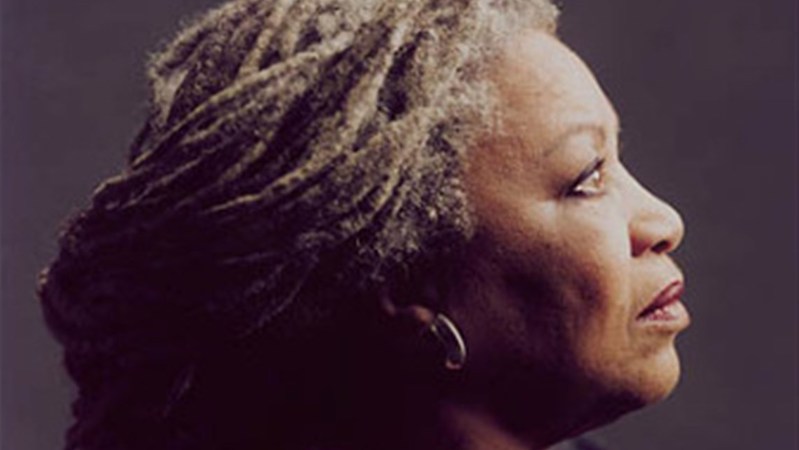
Over the course of a fifty year career, Toni Morrison has made an indelible impact on the landscape of American letters. She has written plays, children’s books, a libretto, and an astounding body of nonfiction, but it is for her novels—the most acclaimed of which, Beloved, is considered by many to be the Great American Novel—that she is most widely celebrated. Along with the Nobel Prize for Literature and the Pulitzer Prize in Fiction, Morrison has been the recipient of the National Humanities Medal and the Presidential Medal of Freedom. She is, in short, a living legend whose intense, lyrical explorations of the horrors of this country’s past and the too-long ignored experiences of black Americans have inspired generations of readers and writers.
Below you’ll find some of the first reviews of each of Morrison’s eleven novels, from critics like Michiko Kakutani and Anita Sethi, as well as fiction writers like Margaret Atwood, John Irving, Edna O’Brien, and Roxane Gay. Not all of them are positive, but all have something interesting to say about the work of this extraordinary author.
*
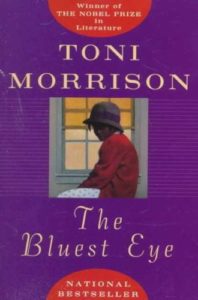
The Bluest Eye (1970)
I had only one desire: to dismember it. To see of what it was made, to discover the dearness, to find the beauty, the desirability that had escaped me, but apparently only me.
“Toni Morrison’s The Bluest Eye is an inquiry into the reasons why beauty gets wasted in this country. The beauty in this case is black; the wasting is done by a cultural engine that seems to have been designed specifically to murder possibilities; the ‘bluest eye’ refers to the blue eyes of the blond American myth, by which standard the black-skinned and brown-eyed always measure up as inadequate. Miss Morrison exposes the negative of the Dick-and-Jane-and-Mother-and-Father-and-Dog-and-Cat photograph that appears in our reading primers, and she does it with a prose so precise, so faithful to speech and so charged with pain and wonder that the novel becomes poetry.
…
I have said ‘poetry.’ But The Bluest Eye is also history, sociology, folklore, nightmare and music. It is one thing to state that we have institutionalized waste, that children suffocate under mountains of merchandised lies. It is another thing to demonstrate that waste, to re-create those children, to live and die by it. Miss Morrison’s angry sadness overwhelms.”
–John Leonard, The New York Times, November 13, 1970
*
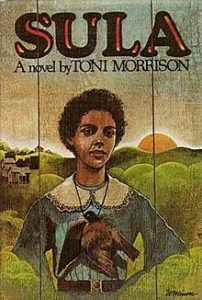
Sula (1973)
Like any artist without an art form, she became dangerous.
“While the setting and the characters continually convince and intrigue, the novel seems somehow frozen, stylized. A more precise yet somehow icy version of The Bluest Eye, it refuses to invade our present in the way we want it to and stays, instead, confined to its time and place.
The heroine, Sula, grows up in a household pulsing with larger-than-life people and activity, presided over by her powerful and probably sorcerous grandmother. Her gentle mother is devoted almost wholly to the practice and pleasures of sensuality. But her cherished friend Nel, the local goody-goody, plays perfect counterpoint to Sula’s intense, life-grabbing insistence that eventually gets read as recklessness, and Sula becomes a threat as her life unfolds against the rest of the black community’s daily life of hardship, humilation and scrabbling for survival.
…
“It’s possible, I guess, to talk about Sula as allegory—about people so paralyzed by the horrors of the past and by the demands of just staying alive that they’re unable to embrace the possibilities of freedom until the moment for it has passed. but Toni Morrison’s novel is too vital and rich to be confined within such limits. Her extravagantly beautiful, doomed characters are locked in a world where hope for the future is a foreign commodity, yet they are enormously, achingly alive. And this book about them—and about how their beauty is drained back and frozen—is a howl of love and rage, playful and funny as well as hard and bitter.
…
“Morrison’s skill at characterization is such that, by the end, it’s as if an enormous but too severely framed landscape has been unrolled and inhabited by people who seem almost mythologically strong and familiar; like the gorgeous characters of Garcia Marquez, they have a heroic quality, and it’s hard to believe we haven’t known them forever.
Yet the comparison can’t be extended: Morrison hasn’t endowed her people with life beyond their place and function in the novel, and we can’t imagine their surviving outside the tiny community where they carry on their separate lives. It’s this particular quality that makes Sula a novel whose long-range impact doesn’t sustain the intensity of its first reading. Reading it, in spite of its richness and its thorough originality, one continually feels its narrowness, its refusal to brim over into the world outside its provincial setting.”
–Sara Blackburn, The New York Times, December 30, 1973
*

Song of Solomon (1977)
You can’t own a human being. You can’t lose what you don’t own. Suppose you did own him.
Could you really love somebody who was absolutely nobody without you? You really want somebody like that?
“Toni Morrison’s first two books—The Bluest Eye with the purity of its terrors and Sula with its dense poetry and the depth of its probing into a small circle of lives—were strong novels. Yet, firm as they both were in achievement and promise, they didn’t fully forecast her new book, Song of Solomon. Here the depths of the younger work are still evident, but now they thrust outward, into wider fields, for longer intervals, encompassing many more lives. The result is a long prose tale that surveys nearly a century of American history as it impinges upon a single family. In short, this is a full novel—rich, slow enough to impress itself upon us like a love affair or a sickness—not the two-hour penny dreadful which is again in vogue nor one of the airless cat’s cradles custom-woven for the delight and job-assistance of graduate students of all ages.
Song of Solomon isn’t, however, cast in the basically realistic mode of most family novels. In fact, its negotiations with fantasy, fable, song and allegory are so organic, continuous and unpredictable as to make any summary of its plot sound absurd; but absurdity is neither Morrison’s strategy nor purpose. The purpose seems to be communication of painfully discovered and powerfully held convictions about the possibility of transcendence within human life, on the time-scale of a single life. The strategies are multiple and depend upon the actions of a large cast of black Americans, most of them related by blood. But after the loving, comical and demanding polyphony of the early chapters (set in Michigan in the early 1930’s), the theme begins to settle on one character and to develop around and out of him.
…
“The end is unresolved…But that very uncertainty is one more sign of the book’s larger truthfulness (no big, good novel has ever really ended; and none can, until it authoritatively describes the extinction from the universe of all human life); and while there are problems (occasional abortive pursuits of a character who vanishes, occasional luxuriant pauses on detail and the understandable but weakening omission of active white characters), Song of Solomon easily lifts above them on the wide slow wings of human sympathy, well-informed wit and the rare plain power to speak wisdom to other human beings. A long story, then, and better than good. Toni Morrison has earned attention and praise. Few Americans know, and can say, more than she has in this wise and spacious novel.”
–Reynolds Price, The New York Times, September 11, 1977
*
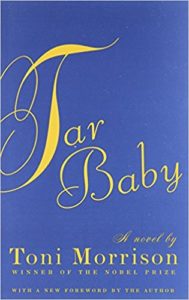
Tar Baby (1981)
At some point in life the world’s beauty becomes enough.
You don’t need to photograph, paint or even remember it. It is enough
“Toni Morrison seems to be returning such risk and mischief to the contemporary American novel, and never more extravagantly than in Tar Baby, her fourth and most ambitious book.
…
“[Valerian Street] lives oblivious to a story within his own family—a story too good for me to spoil for the reader. The family’s loyal black cook, Ondine, will reveal the tale; she and her husband, Sydney, the butler, have devoted most of their lives to serving Valerian Street. They are the white man’s dream of ‘good Negroes,’ which means they love their master’s child as if he were their own, they keep their place, they grow quietly and uncomplainingly old.
They also provide Miss Morrison with an opportunity to exercise her considerable gift for dialogue; this old couple’s conversation is sparkling and through it the reader learns the circumstances of Valerian’s retirement to the Caribbean.
…
“What’s so powerful, and subtle, about Miss Morrison’s presentation of the tension between blacks and whites is that she conveys it almost entirely through the suspicions and prejudices of her black characters. It is the white world that has created this, and in the constant warring between Sydney, Ondine and Jadine, and between Jadine and Son, Miss Morrison uncovers all the stereotypical racial fears felt by whites and blacks alike. Like any ambitious writer, she’s unafraid to employ these stereotypes—she embraces the representative quality of her characters without embarrassment, then proceeds to make them individuals too.
…
“Tar Baby is, of course, a black novel, a novel deeply perceptive of the black’s desire to create a mythology of his own to replace the stereotypes and myths the white man has constructed for him. It is also a book about a woman’s anger at—and her denial of—her need for an impossible man, and in this regard it is a woman’s novel too…Yet Toni Morrison’s greatest accomplishment is that she has raised her novel above the social realism that too many black novels and women’s novels are trapped in. She has succeeded in writing about race and women symbolically.
…
“Some readers will find the overlapping narrative structure an irritation; this is one of the problems with Miss Morrison’s dependence on dialogue to advance and fill in the story. Some readers may resist the movement toward myth in the book’s deliberately symbolic ending -and some complaints, some wish to know more concretely what happens, may be justified…But Toni Morrison is less interested in the final details of her characters lives than she is interested in demonstrating the vast discrepancies between the places black people end up and the places they seek.”
–John Irving, The New York Times, March 29, 1981
*
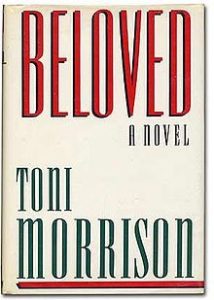
Beloved (1987)
Freeing yourself was one thing, claiming ownership of that freed self was another.
“Toni Morrison’s novels have been constructed, and are magically unsettled, by the unique character of historical memory for black Americans. That is to say, she has wanted to account for black experience that has been ignored or quite inadequately narrated by white historians and novelists, and even more significantly, in order to do that she has needed to confront precisely those aspects of the experience which have blocked memory, made remembering intolerable and memories inexpressible, literally unspeakable. Indeed, the verb ‘rememory’ is invented in her astonishing novel, Beloved, to stand for something like a willed remembering which includes its own strenuous reluctance to return to the past.
Her novels and her people are rooted in a known physical world, shared and chorally spoken for. In such a world even the hardest daily tasks may be welcomed, for there is ‘nothing better than that to start the day’s serious work of beating back the past’. It is with the sudden and inescapable eruptions of the past into the present, however, and with the capacities of people to live with and rework the impossibly painful and humiliating, that her fiction is concerned. White guilt and breast-beating drop away to become a backcloth, an incomprehensible cause, the terrifying question: ‘What are these people?’
…
“Slowly, delicately and shockingly the narrative picks its way backwards to Sethe’s girlhood as a slave, to her escape, to her isolation within a shared past, which is never allowed by Morrison to be more appalling for those who suffered it than the subsequent mutilations they were to commit on themselves in its wake. Time and time again the narrative appears to recoil from its own destination. The novel tells us about implements of torture, imaginatively designed to cause the greatest pain, to curb movement and speech and sleep. It alludes to the viciousness, the unending and inhuman cruelty of white slave-owners in cold, brilliantly-lit asides. It does not forget that there were kinder white people, that there are pleasures for Sethe to remember too. But the story of slavery it tells is always from within the heads of those who were slaves.
…
“Beloved is dispersed by love. She disappears and is gradually forgotten. Her need to understand her own death, to know for certain that her mother killed her because she loved her, is met. That painful, paradoxical love is matched by the discovery Paul D makes during his 18 years of desperate escapes and recaptures that ‘he could not help being astonished by the beauty of this land that was not his.’ Love is the capacity to be moved by beauty and pleasure, to recognise human beings as always human. Out of what she has called ‘a survivalist intention to forget certain things’ Toni Morrison has created a frightening, beautiful and intensely exciting novel about America and its past. I am not able to think of a better one.”
–Jane Miller, The London Review of Books, November 12, 1987
“…another triumph. Indeed, Ms. Morrison’s versatility and technical and emotional range appear to know no bounds. If there were any doubts about her stature as a pre-eminent American novelist, of her own or any other generation, Beloved will put them to rest. In three words or less, it’s a hair-raiser … Through the different voices and memories of the book, including that of Sethe’s mother, a survivor of the infamous slave-ship crossing, we experience American slavery as it was lived by those who were its objects of exchange, both at its best – which wasn’t very good – and at its worst, which was as bad as can be imagined. Above all, it is seen as one of the most viciously antifamily institutions human beings have ever devised. The slaves are motherless, fatherless, deprived of their mates, their children, their kin. It is a world in which people suddenly vanish and are never seen again, not through accident or covert operation or terrorism, but as a matter of everyday legal policy … Beloved is written in an antiminimalist prose that is by turns rich, graceful, eccentric, rough, lyrical, sinuous, colloquial and very much to the point.”
–Margaret Atwood, The New York Times, September 13, 1987
*
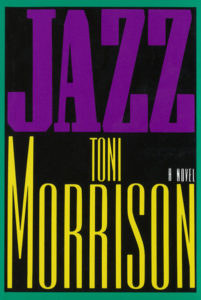
Jazz (1992)
Don’t ever think I fell for you, or fell over you. I didn’t fall in love, I rose in it.
“…Harlem in the 1920’s, Harlem still relatively innocent, when crimes at least were crimes of passion and pity in some currency, Harlem permeated with the thrum of music, Harlem to which those black people who had run from want and violence came to find their stronger, riskier selves. In Ms. Morrison’s robust language we see the sidewalks, the curbstones, Egyptian beads, Kansas fried chicken, doors ajar to speakeasies, an invitation to the low-down hellfire induction of music and sex.
In this and many audacious asides the author conjures up worlds with complete authority. She captures and makes no secret of her anger at the injustices dealt to black women who were mothers, serving women and corpse dressers, women who found refuge only in an angry church and an angry God and for whom pregnancy was worse than death.
…
“In sharp compassionate vignettes, plucked from different episodes of their lives, the author portrays people who are together simply because they were put down together, people tricked for a while into believing that life would serve them, powerless to change their fate—Joe with a faithless wild woman for a mother, a woman he seeks in caves and rock faces, a woman he calls to and asks if she is she—’Just say it, say anything’; Violet unable to repress the seams of erotic memory, remembering the bed with one leg propped on a dictionary; and Dorcas, foxy, provocative, believing sex to be her trump card, which for a few months it was. These are people enthralled then deceived by ‘the music the world makes.’
Do I miss something? Yes. I miss the emotional nexus, the moment shorn of all artifice that brings us headlong into the deepest recesses of feeling … I say this because at one point in the novel when Violet and Alice are ruminating, Alice muses on her own woes, on the treachery done to her by another woman, on the blood punishment she meted out on the husband long since in his grave and, putting the pressing iron down, says, ‘You don’t know what loss is.’ I have a sense of being told this, I do not feel it; my pity is withheld.
It is as if Ms. Morrison, bedazzled by her own virtuosity—a virtuosity that serves her and us and contemporary fiction very well—hesitates to bring us to the last frontier, to a predicament that is both physical and metaphysical, and which in certain fictions, by an eerie transmission, becomes our very own experience. Such alchemy does not occur here.
What remains are the bold arresting strokes of a poster and not the cold astonishment of a painting.”
–Edna O’Brien, The New York Times, April 5, 1992
*

Paradise (1997)
How exquisitely human was the wish for permanent happiness,
and how thin human imagination became trying to achieve it.
“Unfortunately, Paradise is everything that Beloved was not: it’s a heavy-handed, schematic piece of writing, thoroughly lacking in the novelistic magic Ms. Morrison has wielded so effortlessly in the past. It’s a contrived, formulaic book that mechanically pits men against women, old against young, the past against the present.
…
“The basic dynamic of Paradise will vaguely remind Morrison fans of her powerful 1974 novel Sula, which also looked at conformity and rebellion within an insular community. In the case of Paradise, the story, briefly, goes like this: a small all-black Oklahoma town that has been reeling from the racial, generational and political confusions of the 1960s and ’70s finds a scapegoat in an all-female household occupying a former convent on the edge of town. There are rumors of abortions and witchcraft, and complaints against ‘this new and obscene breed of female’ that dares to be self-sufficient.
…
“Nearly every one of these characters is a two-dimensional cliche, thin and papery and disposable. Unlike the heroine of Beloved, who was strong, desperate, loving, vulnerable and angry all at once, almost all the women in this novel are victims: they have spent years grappling with economic hardship, romantic disappointment, social inequity and the stupid misdeeds of men.
The men, on the other hand, are almost uniformly control freaks or hotheads, eager to dismiss independent women as sluts or witches, and determined to make everyone submit to their will.
…
“Whereas earlier Morrison novels like Beloved, Song of Solomon and Sula fused the historical and the mythic, the mundane and the fantastic into a seamless piece of music, this novel remains an earthbound hodgepodge, devoid of both urgency and narrative sleight of hand. It’s neither grounded in closely observed vignettes of real life, nor lofted by the dreamlike images the author has used so dexterously in the past to suggest the strangeness of American history; the novel’s one surreal set-piece feels like a hasty afterthought, clumsily grafted on to try to kick the story to another level.
…
“Had Ms. Morrison persuasively dramatized her story, had she managed to make the reader feel her characters’ plight, she might have realized that such blunt announcements were unnecessary, indeed annoying. As it is, they stand as portentous footnotes in what is a clunky, leaden novel.”
–Michiko Kakutani, The New York Times, January 6, 1998
*
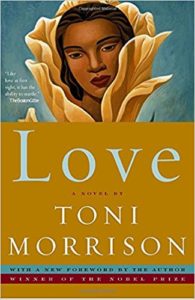
Love (2003)
There were things she shouldn’t see or hear or know about.
“Love is conspicuously absent from Toni Morrison’s eighth novel. Despite the title, the word is spoken only once by a living person. Like the ghosts haunting Morrison’s fictional houses, however, love lingers in a distorted form. At its core are a terrible homesickness and a hunger that seeks to devour its object.
The story centres on a deserted seaside hotel, once owned by the beguiling entrepreneur, Bill Cosey, who dreamed of providing a pre-integration playground and haven for blacks. With Morrison’s characteristic flashbacks, time-shifts and multiple points of view, Love unearths the secret, tangled histories of those who inhabited the Cosey resort before, during and after the civil rights movement.
…
“Morrison exposes the instability of the houses men build from their dreams, destroyed by the passions of their inhabitants, living and dead. Cosey ‘didn’t understand: a dream is just a nightmare with lipstick.’ As the lipstick washes away, we discover how Christine’s fierce territorialism was once a little girl’s desire to reclaim her bedroom, and why her mother, May, develops kleptomania: she must vigilantly protect—or steal—her space in the world.
…
“Love‘s power lies in the luminosity and energy of its poetic images, set off against the narrative obscurity and laced with horror and beauty: crayon-coloured dreams, cotton-mouth snakes, collapsing hotel attics, the pervasive smell of cinnamon and citrus. It is a novel full of abandonment: the places where love should be are haunted instead by desolation and longing to belong.
But Love is also about the gradual disclosure of secrets, the filling in of gaps; when their scattered bones are finally pieced together, the skeletons in the closet have terrifying tales to tell.”
–Anita Sethi, The Observer, November 16, 2003
*
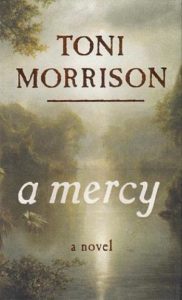
A Mercy (2008)
She learned the intricacy of loneliness:
the horror of color, the roar of soundlessness and the menace of familiar objects lying still.
“When Florens, the central figure of Toni Morrison’s new novel, asks on the first page ‘Can you read?,’ she is not inquiring about any simple kind of literacy. She means, can you read the nature of the world? Do you understand omens? Ordinary notions of cause and effect are stripped away from the characters of A Mercy. Their world is all accident, contingency. Events are beyond mortal control, and there is scant evidence that any immortal guide is at work. Hope, where it exists, is deferred. Florens believes ‘We are baptised and can have happiness when this life is done.’
We are in America around 1690. Slave labour of different varieties sustains farming and trade. The rudimentary social system is predicated on deep inequalities of class and gender. Religion is sectarian and bitter, a force for division rather than coherence. We are looking at the preconditions for the world of Morrison’s most powerful novel, Beloved, in which a black mother kills her daughter rather than let her grow up a slave.
…
“The America that Morrison depicts is not a land hungry for freedom, but a land that is jittery and repressive, fixated on profit and punitive by instinct. Fate and economics bring the characters together, and hold them together only for as long as it takes to recognise common victimhood. The orphans and waifs of Jacob’s farm are a community that threatens to disintegrate as soon as he is dead. Any affective bonds they have formed are frail compared to the imperatives of finding a new way to survive. In making this clear, Morrison avoids sentimentality. But she doesn’t always avoid the portentous; at its worst, this is a book of ritualised postures and cut-rate epiphanies.
…
“Some readers will object that Morrison has been over this territory before; that with these insubstantial characters and this wisp of a narrative she is evoking the spirit of Beloved, rather than creating something new. It is certain that her powerful, elemental material bears reworking and revisiting. The issues she explores as a novelist go to the root of what humanity is, what society is for. They could not be more important or fundamental. What she emphasises here is a sort of grim equality based on suffering; slaves are white as well as black, women of all races are at the mercy of men. In this barren universe you do not reap what you sow, but rather what some stranger has sown, unthinkingly. Good actions trail bad consequences. Terrifying randomness is shot through with intimations of nature’s beauty, and some fragmentary, piecemeal trace – like a race memory – of pity and grace operating in human affairs. The language of the book, always supple, graceful and inventive, is enough reason to read and value it. But there are no changes of tone or pace to sustain the narrative, and a certain authorial weariness behind the whole enterprise. A Mercy is a shadow of the great novel it should be; its half-told tales leave cobweb trails in the mind, like the fragments of a nightmare.”
–Hillary Mantel, The Guardian, November 7, 2008
*
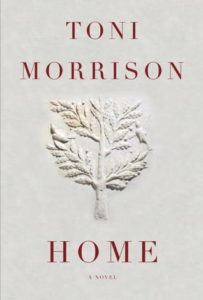
Home (2012)
Misery don’t call ahead. That’s why you have to stay awake – otherwise it just walks on in your door.
“There are topics you may think you’ve had enough of—racism, slavery, anti-Semitism, the Holocaust—but then you read a book like Toni Morrison’s new novel and realize, as Samuel Beckett put it, ‘All has not been said and never will be.’ Home is gorgeous and intense, brutal yet heartwarming—and could only have been written by the author of Beloved and Sula. Deceptively slight, it is like a slingshot that wields the impact of a missile.
…
“Home is as accessible, tightly composed and visceral as anything Morrison has written. The lush, biblical cadences for which she is known have partially given way to shorter, more direct sentences—which still have the capacity to leave a reader awestruck. The book opens with Frank’s recollection of a shocking burial he and his sister witnessed as children when they snuck into a local stud farm to gape at the magnificent horses that ‘rose up like men.’ It’s a scene that becomes horrifyingly clear to him—and the reader—much later.
Morrison raises our gall repeatedly at sickening abominations routinely inflicted on African-Americans: unsafe medical experiments, exclusion from public restrooms, forced gladiatorlike knife fights for the amusement of betting spectators.
…
“I’m not asthmatic, but there were several times when I felt I needed an inhaler or defibrillator or something to catch my breath while reading this devastating, deeply humane—and ever-relevant—book.”
–Heller McAlpin, NPR, May 15, 2012
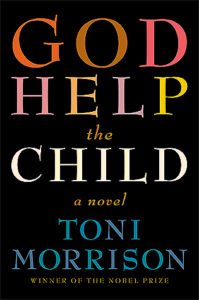
God Help the Child (2015)
You don’t have to love me but you damn well have to respect me.
“God Help the Child is the kind of novel where you can feel the magnificence just beyond your reach. The writing and storytelling are utterly compelling, but so much is frustratingly flawed. The story carries the shape of a far grander book, where the characters are more fully explored and there is far more at stake. As the novel stands, the only characters we know with any kind of depth or significance are Bride, Sweetness and, to a lesser extent, Booker. There are several others of whom we learn little when the narrative clearly demands much more … Yet still, there is that magnificence, burning beneath the surface of every word. The language, shifts in point of view and the audacity of the novel’s premise are overwhelming. Morrison remains an incredibly powerful writer who commands attention no matter the story she is telling. In God Help the Child we have a coming-of-age story for an adult woman in arrested development.”
–Roxane Gay, The Guardian, April 29, 2015

